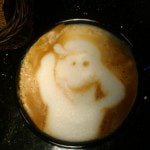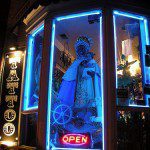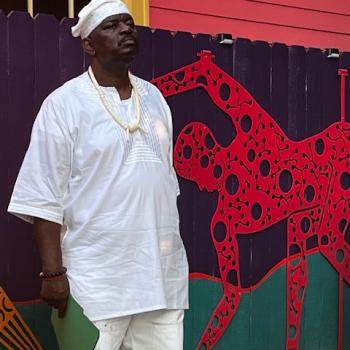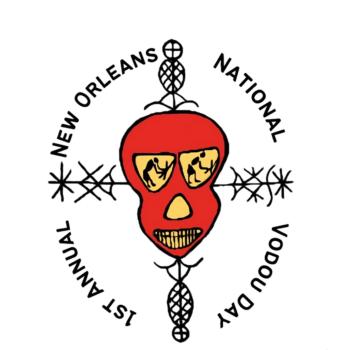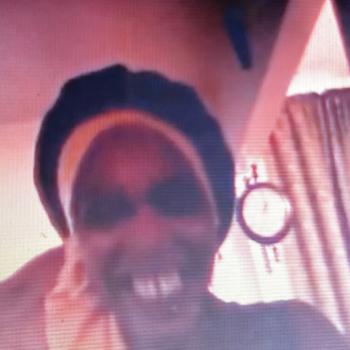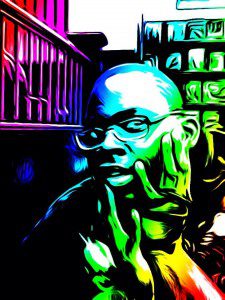
I am very excited today to feature a guest post from Tehron Gillis. Tehron is a Westchester based slam poet and writer, is a voodoo initiate and rootworker. Practicing magic and tarot for over a decade, Tehron works towards exploring LGBTQ and ethnic themes in the craft.
There were not many worries I had about entering the African Diasporan religions but among them; “Am I pronouncing the spirits’ names right?”, “Where do find functional and chic white clothing?”, “Will I remember the trains to my Mambo’s house?” and more daunting “Will my homosexuality be an issue with my religion”. The first three were assuaged by some time with my priestess and a great shopping trip to NYC, but the latter took me on a trip through my religion to find where do LGBTQ people fit in the African Diaspora religions. Anyone who grew up in African Diaspora communities, like myself, can attest to the struggles that LGBTQ people have gone through within these communities. Often we are the subject of blatant discrimination, isolation, and abuse of all kinds. So naturally, and realistically, I was worried that my sexuality would hinder my ability to connect with the African Diaspora religions. With great joy I have found that this has not been the case.
Finding Family
A popular term that LGBTQ people use to refer to our community and its member is “Family” . It’s a beautiful and discreet way we identify ourselves in open without drawing attention to members of our community that wish to remain, for whatever reason, unnoticed. A common practice I have adopted is looking for family in public rituals, pagan events, on feast days, and in botanicas. I almost always find family in these places. I have talked to many practitioners of Santeria, also known as Lucumi, Ifa and Voodoo, that are family and we usual end up exchanging stories about the Lwa and orisha, particularly Oshun, and how they have manifest in our lives. One particular experience that made my priestess laugh was on one of our feast days. We where honoring Maman Bridgette, one of the many spirits that keep the dead, and I went down to a large botanica to get some supplies. While there I was exchanging some flirtation looks with the clerk that was behind the counter. When I checked out we exchanged some words until I crossed my self with my money a common gesture amongst us in the religion. He invited me to his Ile‘s, Lukumi temple, Oya feast that night. I declined since I had my own feast to attend to but he suggest we go out afterward, which I had to also declined because of aforementioned feast. He looked disappointed and so was I but I did take note that that was the first, and certainly not the last time, a guy used a Oya feast as a pick up line.
The Gods & Goddesses
Another place where I find frequently family and our allies is among the Loa and Orisha. The following is a list of Loa and Orisha that have correspondence in LGBTQ themes
Obatala: Seen as androgynous, is referred to as both the masculine and feminine, and keeps the heads of many homosexual men
Inle: The patron of fishermen and woman and patron protector of homosexuals
Oshun: She who deals matters of love, regardless of race, sex, and sexual orientation. One of my, and many other gay men, person head spirits. I have been told by a Santero that “Oshun loves her gays”
Gede Nibo: A member of the Gede family in Haitian Vodou that is said to have a flamboyant sexuality to match his cinnamon anus
Erzulie Dantor: Said to be a patroness of Lesbians.
Chango: The King of Oyo, the Lord of dance and drums, the Thunder Bringer, Fire incarnate, He who did not hang, the God of masculinity, who will do great drag if it means he will win his battles.
Babaluaiye: The Orisha of healing and diseases made more significant to the Family because of the AIDS epidemic.
Inclusive Not Exclusive.
Voodoo Priest Louis Martinie writes in his book The New Orleans Voodoo Tarot that voodoo is inclusive not exclusive. This is a reference to intuitions that try to repress the religion and to the people who’s spirits are drawn to call of spirit. While as individuals we may fall prey to homophobia and transantagonism, the African Diaspora religions offers a space for healing and a bridge that not only connects us to the spirits of nature but to each other as well. The unfortunate truth is this that that people will carry their prejudice as a sword and shield. But I have hope of seeing VeVes made Bayard Rustin and Harvey Milk. An inclusive spiritual practice I do is add victims of hate crimes such as Matthew Shepard to my spiritual ancestors in hopes to heal the damage done to the family and keep their spirit alive. All under the rainbow, or as we know it as the Goddess Aida Wedo, are always welcome.


